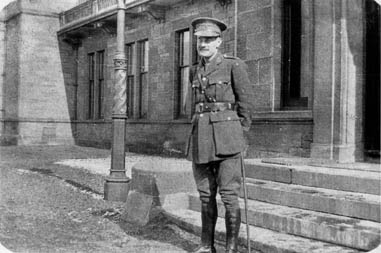|
Virtual Seminars for Teaching Literature Introduction to and information on poets Rupert Brooke, Wilfred Owen, Siegfried Sassoon, Isaac Rosenberg, and Edward Thomas, including links to examples of their poetry. Also introductions to poetry written by Women during the war, and "Trench" poets and songs, with links to examples.
The specific seminar (within the Virtual Seminars for Teaching Literature) studying Isaac Rosenberg's greatest poem (and the greatest poem of the Great War) "Break of Day in the Trenches." The Seminar provides biographical background, and critical analysis of "Break of Day in the Trenches," and invites readers to enter their impressions of the poem and the seminar into an archive.
Both Wilfred Owen and Siegfried Sassoon were patients at the Craiglockhart War Hospital during the late summer and early fall of 1917. The hospital had formerly been a retreat for wealthy alcoholics -- the Craiglockhart Hydropathic Establishment -- offering "the cure" through rest and water therapy. Hence Craiglockhart's nickname "the Hydro." (Sassoon also referred to Craiglockhart as "Dottyville.") Owen arrived
The homepage for the Robert Graves Society. Information about the Society, annoucement and details about up-coming conferences, goings-on, etc. Includes a link to the Gravesiana homepage -- Gravesiana: the Journal of the Robert Graves Society -- with subscription information, an index to the journal, etc. Lost Poets of The Great War Created by Harry Rusche of Emery University. Divided into the sections: The Poets (Rupert Brooke, John McCrae, Wilfred Owen, Isaac Rosenberg, Alan Seeger, and Edward Thomas); Chronology of the War; The Human Cost; Bibliography. World War (1914-1918) War, Peace and Security Guide from the Information Resource Centre, Canadian Forces College. A massive clearinghouse with links to Mailing Lists/Newsgroups; Journals/Documents; and General Resources. Also provides a list of links for very specific interests (naturally, many focus on the Canadian involvement in the war): Aerial Operations; Art and Literature; Biography; Campaigns and Battles; Cryptography; Media and Propaganda; Military Medicine; Modelling; Museums and Memorials; Naval Operations; Oganizations and Programs; Participation by Country; Personal Narratives; Reenactment; and Regimental Histories. World War I Document Archive In additon to primary documents form the First World War, this cite includes links to Memorials, Personal Reminiscences; WWI Biographical Dictionary; and WWI Image Archive. The World War I Document Archive is part of EuroDocs: The Great War and the Shaping of the 20th Century The homepage of the PBS documentary series and companion book, The Great War and the Shaping of the 20th Century created by Jay Winter and Blaine Baggett. Commercial, yes, but very colorful and smartly done, with maps, and interviews with such noted authorities as Paul Fussell and John Keegan. |
.gif)
.jpg)

.jpg)